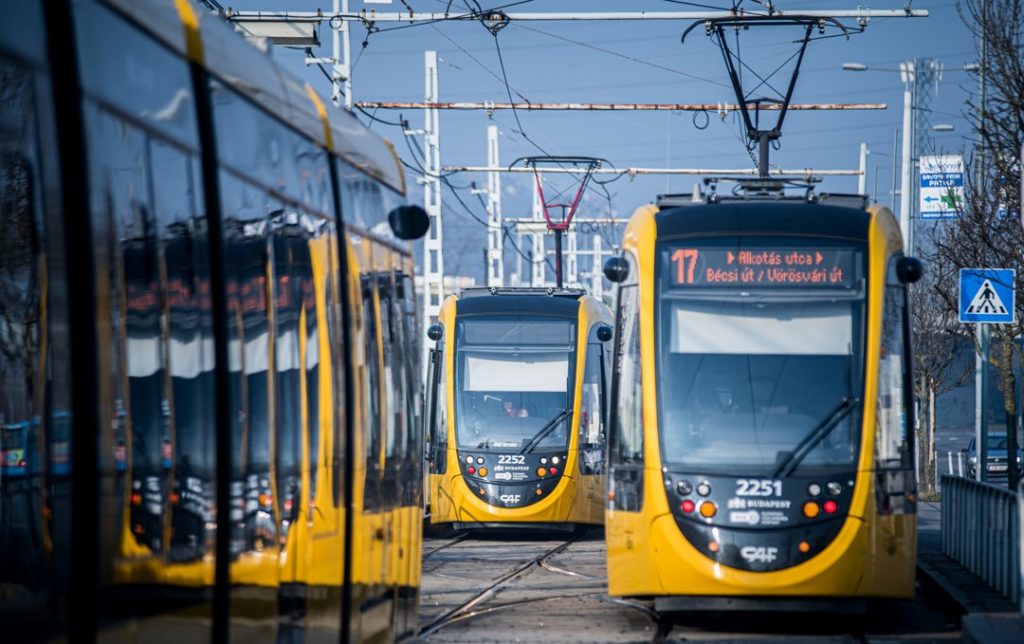 Budapest transport company BKK ordered from CAF 31 additional Urbos trams, 26 of them consisting of 5 modules and another 5 of 9 modules, including the supply of additional equipment and services.
Budapest transport company BKK ordered from CAF 31 additional Urbos trams, 26 of them consisting of 5 modules and another 5 of 9 modules, including the supply of additional equipment and services.
The ordered light rail vehicles are part of a framework contract signed in 2014 for the delivery of 37 vehicles with the option to increase the number of units in possible future extensions. Since then, BKK has already implemented some of these options, having already received an additional 36 Urbos trams, all of which are currently in revenue service. In addition to these, a further 20 units, which were awarded at the end of 2022 and currently being designed and manufactured, will be supplied from summer of 2024.
These are low-floor vehicles, which facilitate access for people with reduced mobility, wheelchairs and pushchairs, and are designed to operate at a service speed of 50 km/h. The 5-module trams span a total length of 34 metres and have a capacity for up to 326 passengers, whilst the 9-module units, which span a total length of 56 metres, can carry up to 562 passengers, making it one of the longest in the world.
The contract was approved by the City Government in February and is part of city’s plan to renew and expand the tram fleet to provide modern, safe and fast services which will lead to the increase of public transport share.
The acquisition of new light rail vehicles is co-financed by the European Union. BKK says that the city can use HUF 54 billion (EUR 144.5 million) to purchase the low-floor and modern trams. To acquire these new ordered vehicles the Government of Hungary had to reach an agreement with the European Commission so that the Municipality can also finance the additional trams from the Cohesion Fund. Although the government and the capital already agreed on the purchase of the trams in May 2019, the decision to secure the funds was made only for this recent purchase.
The management of BKK reached an agreement with CAF trams in November, so the company can buy the new 31 modern, barrier-free trams at almost 2014 prices.At the end of October, BKK announced the procurement of 20 CAF Urbos trams.
A third of the trams which are running in the capital are older than 45 years and they already exceeded their planned service life of 30 years by at least 15 years. Therefore, Budapest cannot wait any longer, it must replace the old vehicles, BKK explains.
On the busiest tram routes, (1, 3, 4, 6, and 17 lines), half of the daily passenger traffic is served by low-floor vehicles.With the arrival of the 51 new CAF trams, 45% of the total tram fleet is made up of low-floor trains.
Budapest is taking important steps to modernise and expand rail transport including in the metropolitan area. The city is modernising and recosntructing the 17 km metro Line 3 that entered operation 40 years ago which intersects the Pest side of the city from the north to the south. It is the most used metro line and plays an essential role in the public transport. The tracks are renewed while all stations will be adapted to passengers with reduced mobility and works are scheduled to be completed by the end of May.
The city is also modernising the tram network including the ones which provide connection with the Line 3 and the project to develop the Nyugati station which has connection with two tram lines and metro Line 3. In 2022, the authorities obtained a EUR 2.76 million co-financing from the Connecting Europe Facility 2021-2027 (CEF2) as part of the Budapest rail junction development project which is in accordance with the European policies to complete the TEN-T core network. The city’s rail node is situated on the Orient – East Med, Rhine-Danube and Mediterranean corridors and its modernisation and expansion will create additional connections and will shift road transport towards railways.
The capital plans to develop the Southern Rail Ring which will provide increased capacity for both the city and Hungary as it is part of the TEN-T and will remove a bottleneck on the European corridors.
On December 28, 2022, the Hungarian Government has approved the Budapest rail strategy until 2024 with projects estimated at EUR 10 billion. They include the metro connections with the train stations, the modernisation and expansion of rail network, and the creation of a one single ticketing system across the metropolitan area all of these expected to increase the transport capacity and frequency of the trains.
Share on:









